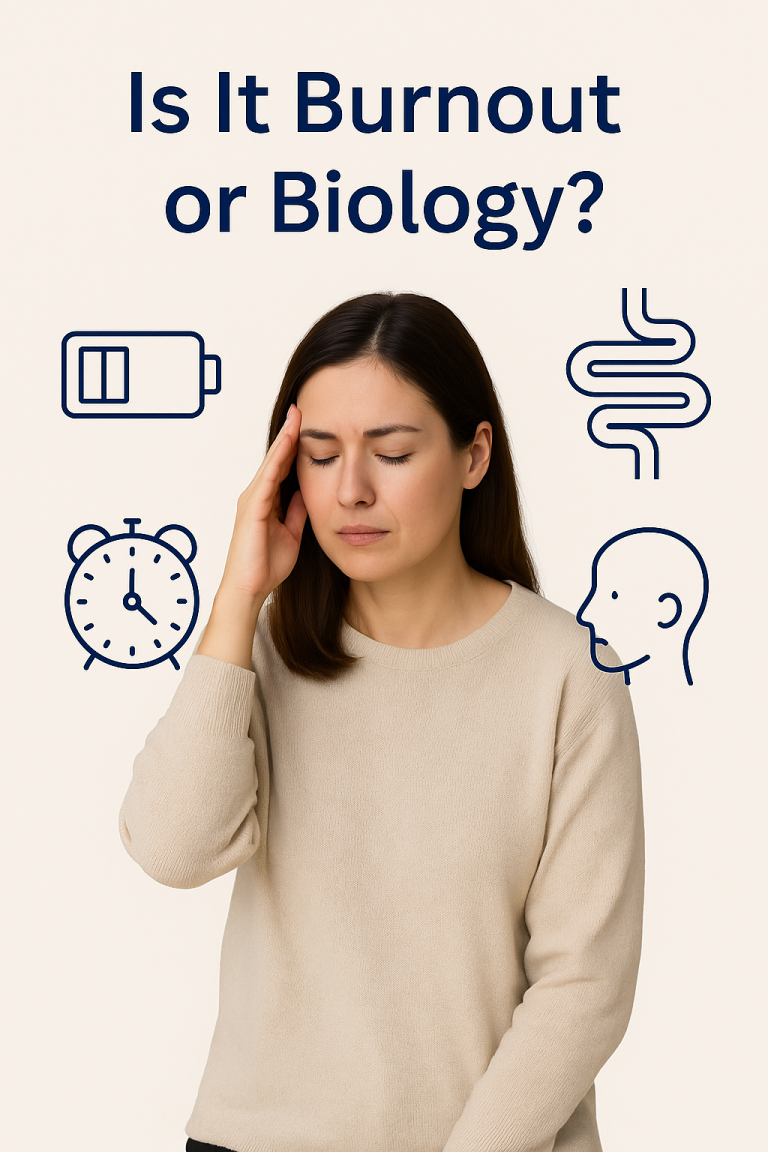
20
MAY
2025
Is It Burnout or Biology? Understanding the Stress-Gut Connection
If you're a busy person, small business owner, or corporate worker juggling endless to-dos—, mom's running the kids around, or are you a healthy person and feeling “off” may have become your norm.
You power through meetings, keep up appearances, and drink coffee to stay awake, only to crash by 3 PM. Add in bloating, brain fog, or stubborn weight, and it’s no wonder your body feels like it’s waving a white flag.
But here’s the thing: this isn’t “just stress.”
There’s a biological root to burnout. And two of the biggest culprits?
👉 Your adrenals and your gut.
The Stress–Gut Cycle (And Why It Keeps You Stuck)
When your body perceives stress—whether from deadlines, poor sleep, or even skipped meals—it activates the HPA axis, a system that signals your adrenal glands to produce cortisol. This “fight or flight” hormone is critical short-term, but long-term stress leads to:
- Dysregulated cortisol (highs, then crashes)
- Increased gut permeability (“leaky gut”)
- Reduced enzyme output (poor digestion)
- Imbalanced microbiome (bloating, inflammation)
And it becomes a vicious cycle.
🌀 Stress weakens the gut → the gut fuels more stress → fatigue and symptoms worsen
Why Testing is the First Step
At Root Cause Nurse, we use two foundational labs to get clarity:
- The GI-MAP (gut microbiome + digestion + pathogens)
- Adrenal Saliva Panel (your daily cortisol curve)
Instead of guessing or self-diagnosing, we test first, then build a plan around your results.
🧠🌿 Take the Root Cause Symptom Assessment
Curious if adrenal or gut dysfunction is behind your symptoms?
Complete this self-assessment. It’s a simple tool we use to help clients decide whether testing is the right next step. Your answers will go straight to Root Cause Nurse (me!), and you’ll get a personalized email explaining your results.
✍️ Adrenal & Gut Health Symptom Assessment
Rate each symptom below based on how often you experience it:
0 = Never | 1 = Occasionally | 2 = Often | 3 = Always
Adrenal Symptoms (Stress/HPA Axis)
This assessment screens for signs of HPA axis dysregulation—your body’s internal stress system. It evaluates symptoms like:
- Morning fatigue
- Midday crashes
- Cravings for salt or sugar
- Poor sleep
- Reliance on caffeine
- Feeling emotionally flat
These patterns can indicate that your cortisol rhythm is disrupted, which affects everything from your energy to your mood and immune function.
Gut Health Symptoms
This assessment screens for common symptoms of gut dysfunction such as:
- Bloating and gas
- Constipation or diarrhea
- Undigested food in stool
- Brain fog or skin issues
- Food sensitivities
These symptoms can signal imbalances in your microbiome, low enzyme output, inflammation, or “leaky gut” that may not show up on routine labs.
✅ What to Do Next
Stress doesn’t just live in your mind—it shows up in your body. When we finally acknowledge that burnout is rooted in biology, everything changes. You stop guessing and start healing.
Submit your Adrenal or Gut Assessment to Root Cause Nurse:
Once you complete this quiz. I’ll personally review your responses and send a follow-up email that includes:
✔️ An explanation of what your scores may mean
✔️ My recommendation for which test (GI-MAP or adrenal) would be most helpful
✔️ A link to schedule a consult or order testing directly
📞 Schedule a Consult
🛍️ Explore My Fullscript Shop
🧬 Complete Intake Forms
📚 References
Slavin, J. L. (2013). Fiber and prebiotics: Mechanisms and health benefits. Nutrients, 5(4), 1417–1435. https://doi.org/10.3390/nu5041417
Kau, A. L., Ahern, P. P., Griffin, N. W., Goodman, A. L., & Gordon, J. I. (2011). Human nutrition, the gut microbiome, and the immune system. Nature, 474(7351), 327–336. https://doi.org/10.1038/nature10213
Mayer, E. A., & Tillisch, K. (2011). The brain-gut axis in abdominal pain syndromes. Annual Review of Medicine, 62, 381–396. https://doi.org/10.1146/annurev-med-012309-103958
Diagnostic Solutions Laboratory. (2024). GI-MAP™ clinical applications. Retrieved from https://www.diagnosticsolutionslab.com
McEwen, B. S. (2007). Physiology and neurobiology of stress and adaptation: Central role of the brain. Physiological Reviews, 87(3), 873–904. https://doi.org/10.1152/physrev.00041.2006
Sapolsky, R. M. (2004). Why zebras don’t get ulcers: The acclaimed guide to stress, stress-related diseases, and coping. Henry Holt and Company.
Chrousos, G. P. (2009). Stress and disorders of the stress system. Nature Reviews Endocrinology, 5(7), 374–381. https://doi.org/10.1038/nrendo.2009.106
Kalish, D. (2010). The Kalish Method: Healing the Body, Mapping the Mind. Kalish Institute Publications.
© Copyright. All rights reserved.
We need your consent to load the translations
We use a third-party service to translate the website content that may collect data about your activity. Please review the details in the privacy policy and accept the service to view the translations.